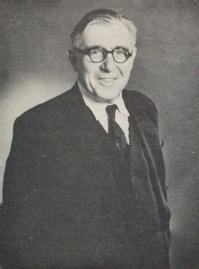The Minister speaks: the Crossman Diaries

The papers of the politician and writer Richard Crossman form one of the most important personal archives held at the Modern Records Centre. Presented here are extracts from the sound recordings of the first revision of Crossman’s famous diaries, which were published as The diaries of a Cabinet minister between 1975 and 1977.
The recordings formed one stage in a complicated process of transcription and re-drafting, so in places they differ considerably from the published versions. Together with the unpublished diary Crossman kept in 1970 as editor of the New Statesman, they can be heard in their entirety from the relevant descriptions in our on-line catalogue. In 2012, thanks to a generous donation from Virginia Crossman, Richard Crossman’s daughter, they were digitised in order to safeguard their preservation and make them more accessible.
More information about the diaries, and also about other aspects of Crossman’s career, opinions and personality can be found on the Researching Crossman pages on our web site. There are also links to some of these pages under the descriptions of the extracts. Transcripts of many of Crossman's broadcasts on radio and television have also been digitised and can be searched.
"Realists against gesture-makers", 22 November 1964 (3:23)
After a month in office, Crossman reflects on his work as a minister and on the Cabinet.
Names mentioned in this extract: Harold [Wilson], Prime Minister; George Brown, Secretary of State for Economic Affairs; [Fred] Willey, Minister of Land and Natural Resources; Bill Rodgers, Parliamentary Under-Secretary at the Department for Economic Affairs.
More on Crossman’s views on prime ministers and the Cabinet
"They gave me the most exhilarating time", 3 December 1964 (2:35)
Young architects and sociologists enthuse the Minister about the system-building of housing. The zeal expressed here for new ways of providing high-density housing cheaply and quickly (in this case in Oldham) contrasts poignantly with the disrepute into which these methods later fell.
More on Crossman’s work as Minister of Housing and Local Government
“You’re lily-livered, you’re cowardly, I can’t stick it”, 17 June 1969 (2:57)
The Prime Minister driven to drink over In place of strife.
This is part of Crossman’s account of what he described as “the most devastating Cabinet meeting I have attended” (Diaries of a Cabinet minister, volume three, page 523). Harold Wilson found himself largely isolated over his insistence on the inclusion of penal clauses against the trade unions in a bill based on Barbara Castle’s White Paper, In place of strife: a policy for industrial relations (which turned out to be an ironic title). Other names mentioned in this extract: Fred Peart, Minister of Agriculture; Roy Jenkins, Chancellor of the Exchequer.
Documents relating to In place of strife in our holdings
“Infinity in a really deep sense of the word”, 20 July 1969 (3:42)
The moon mission and a TV programme prompt musings about the universe and the meaning (or meaninglessness) of life.
Names mentioned in this extract: John Freeman, British Ambassador to the United States; Anne, Crossman’s wife.
“Committed to Armageddon”, 16 Mar 1970 (1:50)
Israeli hawkishness epitomised by “Young Turk” Shimon Peres (later Prime Minister and President of Israel).
Although he was a 'dove', Crossman's support for Israel was not shaken by the apparently uncompromising stance of its leaders at this time. Other names mentioned in this extract: “B-G” (David Ben-Gurion, former Prime Minister of Israel); Moshe Dayan, Israeli Minister of Defence; Meyer Weisgal, president of the Weizmann Institute of Science; [Chaim] Weizmann, first President of Israel.
